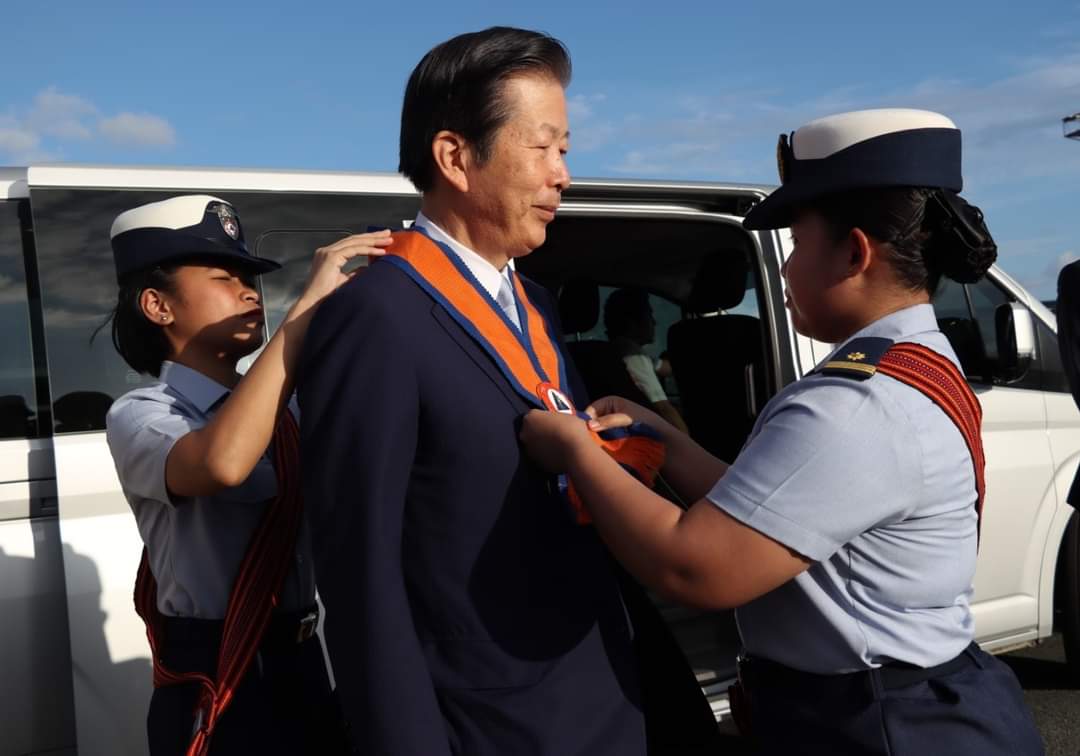Japanese party leader backs PCG plan to buy additional multi-role ships
At A Glance
- Natsuo Yamaguchi, chief representative of Japan's Komeito party, backed the plan of the Philippine Coast Guard to procure additional 97-meter multi-role response vessels.
- The PCG had earlier bought two 97-meter Kunigami-class MRRVs namely BRP Teresa Magbanua (MRRV-9701) and BRP Melchora Aquino (MRRV-9702) from Japanese shipmaker Mitsubishi Shipbuilding.
- Yamaguchi and PCG Commandant Adm. Artemio Abu emphasized the importance of the bilateral cooperation of the Philippines and Japan in combatting challenges and preventing tensions in the West Philippine Sea (WPS).
A political party leader in Japan has expressed support for the Philippine Coast Guard’s (PCG) acquisition of additional 97-meter multi-role response vessels (MRRVs) as part of efforts to better safeguard the country’s vast coastline.

This was emphasized during the courtesy visit of Natsuo Yamaguchi, chief representative of Komeito party, on PCG Commandant Adm. Artemio Abu at the PCG headquarters in Port Area, Manila last August 17.
Komeito is a political party in Japan.
“In recognition on the need to further enhance the capabilities and effectiveness of the PCG in safeguarding its maritime interests and ensuring the safety and security of its maritime borders, Hon. Yamaguchi expressed his support on the acquisition of additional 97-meter Japanese made vessel,” PCG spokesperson Rear Adm. Armando Balilo said on Saturday, Aug. 19.
The PCG had earlier bought two 97-meter Kunigami-class MRRVs namely BRP Teresa Magbanua (MRRV-9701) and BRP Melchora Aquino (MRRV-9702) from Japanese shipmaker Mitsubishi Shipbuilding.
They are considered as two of the largest and most advance assets of the PCG.
Abu had earlier said that the PCG would procure additional 97-meter MRRVs to complement the BRP Teresa Magbanua and BRP Melchora Aquino.
Meanwhile, Abu and Yamaguchi emphasized the importance of the bilateral cooperation of the Philippines and Japan in combatting challenges and preventing tensions in the West Philippine Sea (WPS).
“[B]oth maritime nations engaged to further promoting cooperation to the field of maritime law enforcement,” Balilo noted.
Yamaguchi also elaborated his plans to provide more education and training opportunities for the PCG, including with the inclusion of the Maritime Safety and Security Policy Program (MSP) which he established as its founding father.
The MSP is a program designed and administered jointly by GRIPs and Japan Coast Guard to enable students to benefit from its resources in the fields of public policy, security studies, maritime safety, and maritime security.
“[The] said program is profitable as it endeavors the establishment of students’ professional knowledge, analytical skills, and communication skills relevant to their work while becoming members of a network of future coast guard leaders in the world,” Balilo explained.